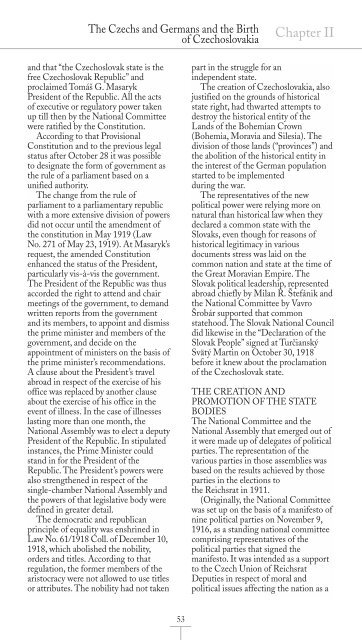the nationality of all inhabitants of the czech provinces and ...
the nationality of all inhabitants of the czech provinces and ...
the nationality of all inhabitants of the czech provinces and ...
Create successful ePaper yourself
Turn your PDF publications into a flip-book with our unique Google optimized e-Paper software.
The Czechs <strong>and</strong> Germans <strong>and</strong> <strong>the</strong> Birth<br />
<strong>of</strong> Czechoslovakia<br />
<strong>and</strong> that “<strong>the</strong> Czechoslovak state is <strong>the</strong><br />
free Czechoslovak Republic” <strong>and</strong><br />
proclaimed Tomáš G. Masaryk<br />
President <strong>of</strong> <strong>the</strong> Republic. All <strong>the</strong> acts<br />
<strong>of</strong> executive or regulatory power taken<br />
up till <strong>the</strong>n by <strong>the</strong> National Committee<br />
were ratified by <strong>the</strong> Constitution.<br />
According to that Provisional<br />
Constitution <strong>and</strong> to <strong>the</strong> previous legal<br />
status after October 28 it was possible<br />
to designate <strong>the</strong> form <strong>of</strong> government as<br />
<strong>the</strong> rule <strong>of</strong> a parliament based on a<br />
unified authority.<br />
The change from <strong>the</strong> rule <strong>of</strong><br />
parliament to a parliamentary republic<br />
with a more extensive division <strong>of</strong> powers<br />
did not occur until <strong>the</strong> amendment <strong>of</strong><br />
<strong>the</strong> constitution in May 1919 (Law<br />
No. 271 <strong>of</strong> May 23, 1919). At Masaryk’s<br />
request, <strong>the</strong> amended Constitution<br />
enhanced <strong>the</strong> status <strong>of</strong> <strong>the</strong> President,<br />
particularly vis-à-vis <strong>the</strong> government.<br />
The President <strong>of</strong> <strong>the</strong> Republic was thus<br />
accorded <strong>the</strong> right to attend <strong>and</strong> chair<br />
meetings <strong>of</strong> <strong>the</strong> government, to dem<strong>and</strong><br />
written reports from <strong>the</strong> government<br />
<strong>and</strong> its members, to appoint <strong>and</strong> dismiss<br />
<strong>the</strong> prime minister <strong>and</strong> members <strong>of</strong> <strong>the</strong><br />
government, <strong>and</strong> decide on <strong>the</strong><br />
appointment <strong>of</strong> ministers on <strong>the</strong> basis <strong>of</strong><br />
<strong>the</strong> prime minister’s recommendations.<br />
A clause about <strong>the</strong> President’s travel<br />
abroad in respect <strong>of</strong> <strong>the</strong> exercise <strong>of</strong> his<br />
<strong>of</strong>fice was replaced by ano<strong>the</strong>r clause<br />
about <strong>the</strong> exercise <strong>of</strong> his <strong>of</strong>fice in <strong>the</strong><br />
event <strong>of</strong> illness. In <strong>the</strong> case <strong>of</strong> illnesses<br />
lasting more than one month, <strong>the</strong><br />
National Assembly was to elect a deputy<br />
President <strong>of</strong> <strong>the</strong> Republic. In stipulated<br />
instances, <strong>the</strong> Prime Minister could<br />
st<strong>and</strong> in for <strong>the</strong> President <strong>of</strong> <strong>the</strong><br />
Republic. The President’s powers were<br />
also streng<strong>the</strong>ned in respect <strong>of</strong> <strong>the</strong><br />
single-chamber National Assembly <strong>and</strong><br />
<strong>the</strong> powers <strong>of</strong> that legislative body were<br />
defined in greater detail.<br />
The democratic <strong>and</strong> republican<br />
principle <strong>of</strong> equality was enshrined in<br />
Law No. 61/1918 Coll. <strong>of</strong> December 10,<br />
1918, which abolished <strong>the</strong> nobility,<br />
orders <strong>and</strong> titles. According to that<br />
regulation, <strong>the</strong> former members <strong>of</strong> <strong>the</strong><br />
aristocracy were not <strong>all</strong>owed to use titles<br />
or attributes. The nobility had not taken<br />
53<br />
Chapter II<br />
part in <strong>the</strong> struggle for an<br />
independent state.<br />
The creation <strong>of</strong> Czechoslovakia, also<br />
justified on <strong>the</strong> grounds <strong>of</strong> historical<br />
state right, had thwarted attempts to<br />
destroy <strong>the</strong> historical entity <strong>of</strong> <strong>the</strong><br />
L<strong>and</strong>s <strong>of</strong> <strong>the</strong> Bohemian Crown<br />
(Bohemia, Moravia <strong>and</strong> Silesia). The<br />
division <strong>of</strong> those l<strong>and</strong>s (“<strong>provinces</strong>”) <strong>and</strong><br />
<strong>the</strong> abolition <strong>of</strong> <strong>the</strong> historical entity in<br />
<strong>the</strong> interest <strong>of</strong> <strong>the</strong> German population<br />
started to be implemented<br />
during <strong>the</strong> war.<br />
The representatives <strong>of</strong> <strong>the</strong> new<br />
political power were relying more on<br />
natural than historical law when <strong>the</strong>y<br />
declared a common state with <strong>the</strong><br />
Slovaks, even though for reasons <strong>of</strong><br />
historical legitimacy in various<br />
documents stress was laid on <strong>the</strong><br />
common nation <strong>and</strong> state at <strong>the</strong> time <strong>of</strong><br />
<strong>the</strong> Great Moravian Empire. The<br />
Slovak political leadership, represented<br />
abroad chiefly by Milan R. Štefánik <strong>and</strong><br />
<strong>the</strong> National Committee by Vavro<br />
Šrobár supported that common<br />
statehood. The Slovak National Council<br />
did likewise in <strong>the</strong> “Declaration <strong>of</strong> <strong>the</strong><br />
Slovak People” signed at Turčianský<br />
Svätý Martin on October 30, 1918<br />
before it knew about <strong>the</strong> proclamation<br />
<strong>of</strong> <strong>the</strong> Czechoslovak state.<br />
THE CREATION AND<br />
PROMOTION OF THE STATE<br />
BODIES<br />
The National Committee <strong>and</strong> <strong>the</strong><br />
National Assembly that emerged out <strong>of</strong><br />
it were made up <strong>of</strong> delegates <strong>of</strong> political<br />
parties. The representation <strong>of</strong> <strong>the</strong><br />
various parties in those assemblies was<br />
based on <strong>the</strong> results achieved by those<br />
parties in <strong>the</strong> elections to<br />
<strong>the</strong> Reichsrat in 1911.<br />
(Origin<strong>all</strong>y, <strong>the</strong> National Committee<br />
was set up on <strong>the</strong> basis <strong>of</strong> a manifesto <strong>of</strong><br />
nine political parties on November 9,<br />
1916, as a st<strong>and</strong>ing national committee<br />
comprising representatives <strong>of</strong> <strong>the</strong><br />
political parties that signed <strong>the</strong><br />
manifesto. It was intended as a support<br />
to <strong>the</strong> Czech Union <strong>of</strong> Reichsrat<br />
Deputies in respect <strong>of</strong> moral <strong>and</strong><br />
political issues affecting <strong>the</strong> nation as a


